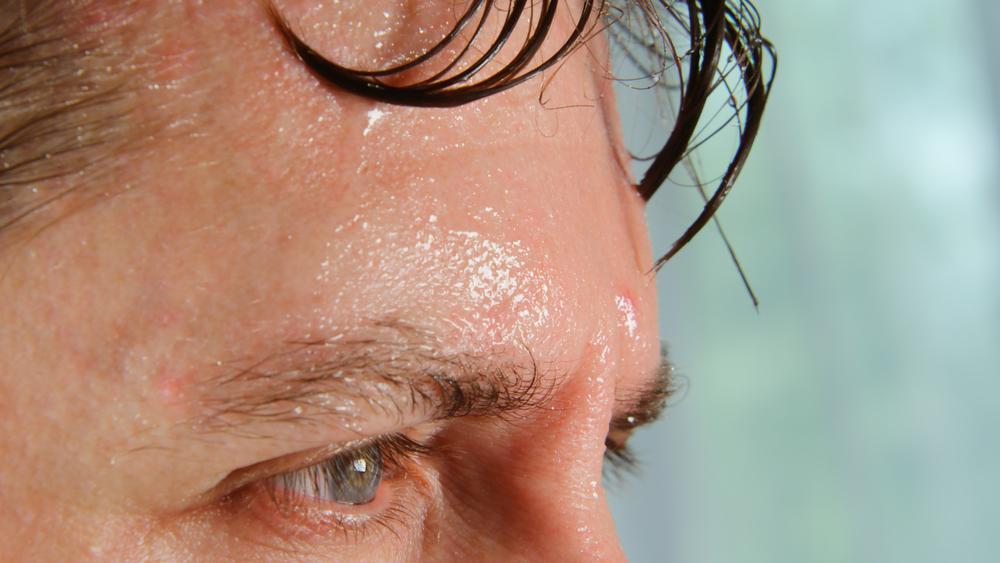Last Updated:
March 27th, 2025
The withdrawal process can create distressing new changes in your body that undermine the well-being you need for full recovery. One common physical symptom is your body releasing sweat, which can be uncomfortable and difficult to manage.
We discuss why sweating is such a common factor of recovery and give you some tips to help you feel more comfortable during detoxification.
What are the physical symptoms of withdrawal detox?
While the length of a detox programme varies depending on the severity of the alcohol or drug addiction, the process is often plagued with new and uncomfortable withdrawal symptoms. Physical symptoms can range in severity and may peak around the third day of the cleansing process. Some physical withdrawal symptoms include:
- Rapid and fluctuating heart rate or palpitations
- Disturbed sleep, including insomnia and fatigue
- Headaches
- Stomach issues, nausea, vomiting and diarrhoea
- Tremors, shaking and, in severe cases, seizures
How does perspiration relate to the withdrawal process?
In addition to some of the symptoms mentioned above, many people experience excessive sweating and shivers as the body detoxifies. The detox process will naturally cause peaks and troughs in your core body temperature and sweating helps with regulating these changes. This response is primarily driven by your autonomic nervous system, which can be dysregulated as your body gets used to functioning without a substance it has grown to depend upon.
Sweat consists of 99% water, with a tiny amount of chemicals such as ammonia, urea, salts and sugars. Some research suggests that trace amounts of heavy metals are also expelled from the body during detox, including mercury, lead and arsenic. However, the liver and kidneys remain as your primary detoxifying organs and sweating is primarily for cooling down, not for detoxifying.
Which substances cause excessive sweating in withdrawal?
Withdrawing from a drug or alcohol addiction can be an overwhelming and frightening process. Research shows that exposure to stressful situations raises your body temperature, making you sweat to cool your body down.
Waking up in the middle of the night drenched in sweat is distressing, disrupting your sleep quality and the peace of mind you need to recover comfortably.
Some research suggests that sudden cessation can lead to a condition called “adenylyl cyclase superactivation-based central excitation.” One symptom of this condition is a change in how your enzymes control the widening and contraction of your blood vessels. Tissues in the body can be flooded and then deprived of blood which leads you to experience hot and cold flushes. Heat makes you sweat and then the cooling sensation can make wet skin feel cold, to the point of shivers.
How can I better manage perspiration during withdrawal?
While sweating is considered a relatively common result of alcohol and drug detox, it may reach the point of excess, called “hyperhidrosis”, and can make the recovery process more uncomfortable. Generally, hyperhidrosis is not considered life-threatening, but it can become distressing and affect your overall well-being in recovery.
Here are some ways you can help better manage sweating for a more comfortable recovery:
Replace sugary drinks you may normally choose with water as often as you can, or add citrus peels and healthy sweeteners if you have cravings. Being dehydrated creates a craving for water, and this craving may actually be mistaken for another during your recovery period. Create routines where you drink more water to support stronger recovery.
For example, sugar and processed foods are linked with many diseases that hinder the body’s ability to detoxify, harming the organs needed for recovery like your liver and kidneys. Detoxing can involve eliminating excess water, so cutting back on salt can help, as salt may cause your body to retain excess fluid. Increasing potassium-rich foods can also help counterbalance salt’s effects.
In addition, try to create an environment focused on hope and self-efficacy, as these will both affect your likelihood of succeeding. It may help to have helpful messages and photos of loved ones nearby to remind you of why you’re striving to recover.
Where can I turn for help with substance detox?
Trying to detox alone can be extremely difficult and may increase the risk of relapse. If you or a loved one needs support with withdrawal symptoms, we want to let you know that you are not alone.
At UKAT, we specialise in structured detox programmes designed to help you through withdrawal with expert care. Our holistic drug and alcohol detox programmes ensure you get the highest level of care every step of the way.
Your journey to a healthier, substance-free life starts today. Reach out to UKAT and take the first step toward lasting recovery.
(Click here to see works cited)
- “Sweat.” Sweat – an Overview | ScienceDirect Topics, www.sciencedirect.com/topics/medicine-and-dentistry/sweat
- Kuan WH, Chen YL, Liu CL. Excretion of Ni, Pb, Cu, As, and Hg in Sweat under Two Sweating Conditions. Int J Environ Res Public Health. 2022 Apr 4;19(7):4323. doi: 10.3390/ijerph19074323. PMID: 35410004; PMCID: PMC8998800.
- Oka T. Psychogenic fever: how psychological stress affects body temperature in the clinical population. Temperature (Austin). 2015 Jun 3;2(3):368-78. doi: 10.1080/23328940.2015.1056907. PMID: 27227051; PMCID: PMC4843908.
- Yoda T, Crawshaw LI, Nakamura M, Saito K, Konishi A, Nagashima K, Uchida S, Kanosue K. Effects of alcohol on thermoregulation during mild heat exposure in humans. Alcohol. 2005 Jul;36(3):195-200. doi: 10.1016/j.alcohol.2005.09.002. PMID: 16377461.
- Moeller, Rachael. “Cocaine Curtails Body’s Ability to Cool Off.” Scientific American, Scientific American, 20 Feb. 2024, www.scientificamerican.com/article/cocaine-curtails-bodys-ab/.
- Shah M, Huecker MR. Opioid Withdrawal. [Updated 2023 Jul 21]. In: StatPearls [Internet]. Treasure Island (FL): StatPearls Publishing; 2025 Jan-. Available from: https://www.ncbi.nlm.nih.gov/books/NBK526012/
- NHS Choices, NHS, www.nhs.uk/conditions/excessive-sweating-hyperhidrosis
- Increased Pain Sensitivity in Alcohol Withdrawal Syndrome – Jochum – 2010 – European Journal of Pain – Wiley Online Library, onlinelibrary.wiley.com/doi/abs/10.1016/j.ejpain.2009.11.008




